Summary
An arraignment is the formal beginning of the criminal process and, in most cases, it is the first time you appear in a court room after a DUI arrest. At your arraignment, a judge will advise you of your charges, the possible penalties, any mandatory minimums, and they will ask for your plea.
Transcript
An arraignment is the formal beginning of the criminal process in your case. And in most cases, it will be the first time you have to appear in a courtroom.
At the arraignment, the judge is required to advise you of what it is that you're charged with, the possible penalties, any mandatory minimum penalties, and to enter a plea on your behalf. This plea will almost always be not guilty. This doesn't mean you can't accept responsibility if you made a mistake. It simply means that you're protecting all of your rights because in an arraignment, your lawyer hasn't had a chance to work on the case with the prosecutor or with you in order to find you a better resolution.
Also at an arraignment, a judge can impose reasonable conditions of your continued release. Often, these are things like law-abiding behavior, not drinking alcohol, but in some cases they can be more extreme, such as driving with an ignition interlock device or even bail.
You have the right to be represented throughout your case including at your arraignment. Having an attorney with you at your arraignment is the best way to ensure that your rights are protected right from the start.


